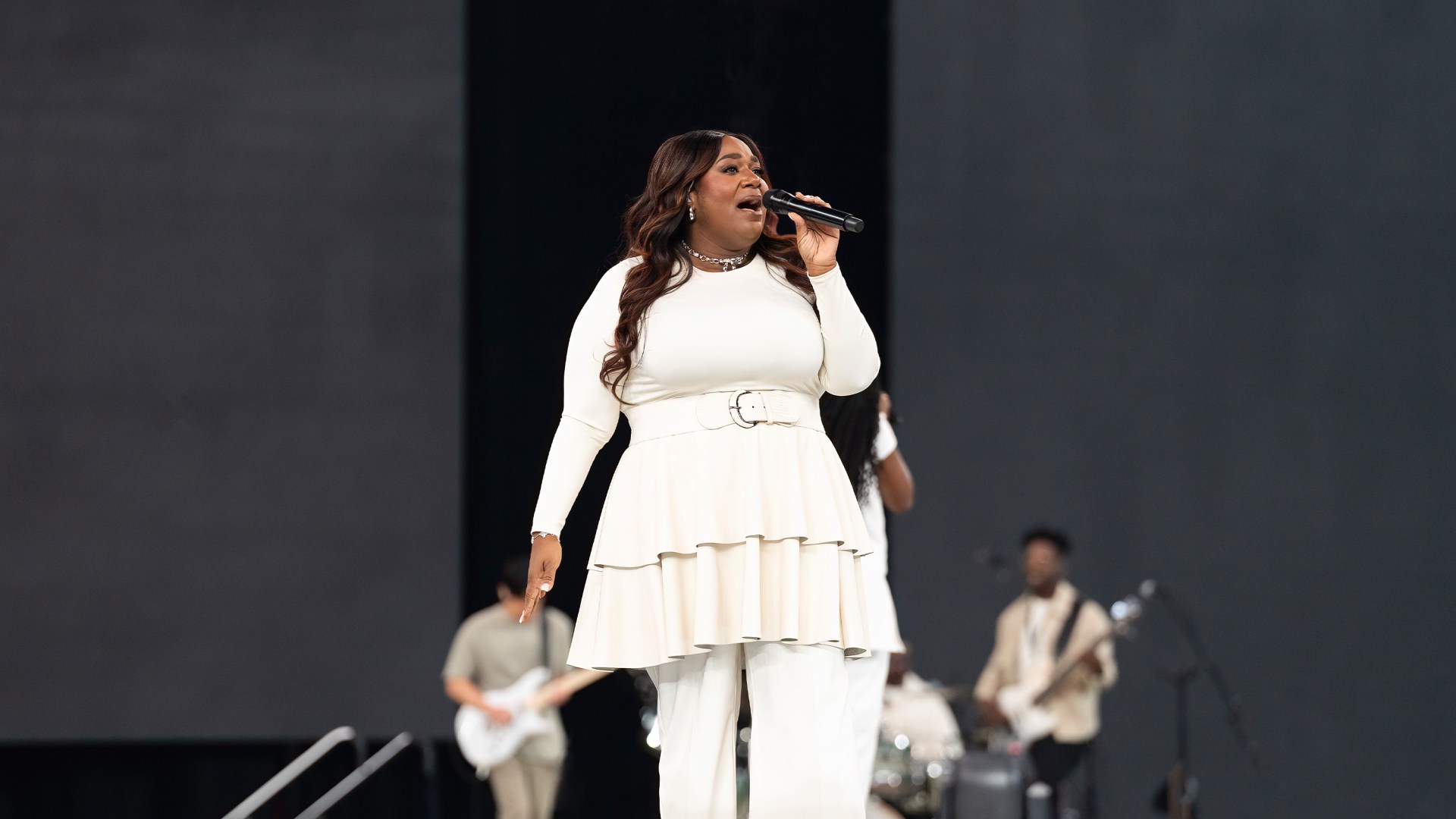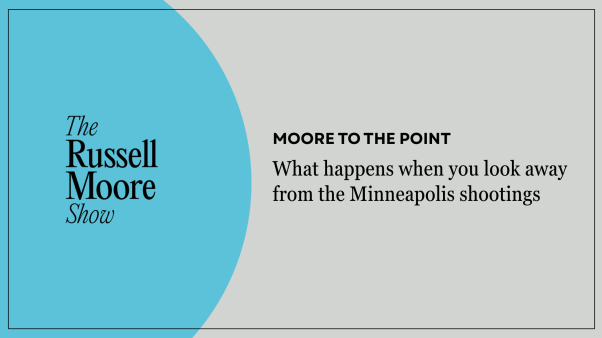Naomi Raine started to understand worship as a ten-year-old, listening to her parents’ church choir rehearse the song “Breathe” in their living room.
“I remember sneaking downstairs and hiding in the bathroom,” Raine told CT. “I grew up hearing my parents sing all the time, but something shifted for me that night as I heard them sing, ‘This is the air I breathe.’”
Around that time, Raine’s parents bought her a keyboard, and she started writing songs in the privacy of her cramped bedroom closet. Her music career also started out as a solitary one. Now, she’s writing and performing with some of the most popular artists in Christian music.
Raine’s performance-and-songwriting style was deeply formed by the charismatic practices of the church where her parents served as worship leaders. She grew up immersed in the Black gospel tradition and contemporary Christian music (CCM), a confluence that’s evident in the music she helped create as a founding member of Maverick City Music.
The popular worship collective, known for hits like “Jireh” and “Promises,” became one of the most influential producers of contemporary worship music in the US with its breakout album Old Church Basement (2021), a collaboration with Elevation Worship. It blends the anthemic style of groups like Elevation and Bethel Music with elements of Black gospel.
Maverick City’s success and fusion of different traditions have drawn praise and criticism in the industry. Recently, internal divisions and a pending lawsuit have gained public attention. As controversy continues to plague the group’s profile, Raine has moved into a new phase of her career. “I think the ministry is getting overshadowed by the opinions,” she told CT. Raine recently announced her departure from Maverick City Music, along with collaborator Chandler Moore, and is releasing new music as a solo artist.
Her new album, Jesus Over Everything, features an impressive roster of guests, including rapper Anike, Tasha Cobbs Leonard, and Christine D’Clario. Raine also serves as a pastor at Fresh Start Christian Center in Mount Vernon, New York.
Raine spoke with CT about her journey with Maverick City Music, the significance of the songs the group created together, and the need for multiple sounds and styles in the world of worship.
This interview has been edited for clarity and length.
Maverick City Music has become such an influential force in the contemporary worship music world, but unlike some of these other collectives like Bethel and Elevation, it didn’t grow out of a local church. How did the group start collaborating?
So I got Lyme disease. [Laughs] Okay, I want to tell you everything, but I’m going to answer the question. I got Lyme disease in 2018, and I think that was the Lord forcing me to rest. At the time, I was saying yes to everything. I had written a song called “Pour Me Out” that was starting to get some traction. I performed in a showcase at the Dove Awards. Todd Dulaney covered the song and asked me to sing on his album. I was getting my first introduction into the industry. But then I get sick, and I have to start saying no.
In 2019, I’m recovering, and I feel like the Lord is healing me. I see online that Bethel is doing a Black History Month worship set. Chandler Moore was going to be there, and Dante Bowe. I messaged the organizer and told him, “Hey, you need a woman there. How about my friend Casey J?” He responded, “How about you?”
So I said yes. They couldn’t pay me, but they did give me a place to stay. That’s where I met Chandler and Jonathan Jay and Brandon Lake for the first time. We wrote some songs and recorded them. These sessions ended up creating the album that became Maverick City, Vol. 1.
If you watch those first videos, you can see me reading from my phone because we had just written the songs a few hours before.
The beginning of Maverick City Music coincided so closely with the start of the 2020 pandemic. How do you think that timing impacted the reception?
I remember the week we recorded “Promises” in Atlanta, fall of 2019. When we finished recording the song, I felt terrible about it—like it was a hodgepodge, the song put together like a quilt. The room we recorded in was hot. We were packed in there like sardines. I couldn’t see the members of the band I needed to see.
But Tony [Brown] decided that was the song we were going to release. He sent the final version out, but I don’t think I even listened. We were all just trying to get through the pandemic—feeding kids and holding it together.
But when I finally listened to the whole thing and saw the response, I realized that song was what people needed at that time. We didn’t know we were going to need a song about the faithfulness of God, a God who keeps his promises.
“Promises” wasn’t the only song we had for that moment; we also had “The Blessing.” We survived on those songs.
The response to Maverick City Music was so enthusiastic. You almost immediately started collaborating with some of the biggest names in worship music. But there was also a lot of scrutiny directed at the group and the music you created. How did you experience the response?
It felt confusing. I think that’s the best word. We were just making the music that we loved. It was prayerful music. At our writing camps, we prayed, “Before we do this, Lord, what do you want to do?”
We were in our Scripture, trying to write music that was biblically sound. I’m a pastor as well. I’m not playing games with the songs that I release. There’s creativity, of course, but I do believe that the Lord breathed on us. So it was confusing when it seemed like just because there was success and because the music was gaining traction, people assumed something was wrong.
Now when I look back, I realize that we were just so different, and people don’t always appreciate different. Change is difficult for people.
I was never the person to be like, “It’s race.” But what I have experienced has helped me to recognize that some of the backlash was racially related. It is what it is, right?
We got too big too fast, and most of us were people of color. I think that was threatening to some people in the CCM world. I don’t think it was intentional. I think it was just “Wait, where did this come from?” and also “That’s not how we would do this.”
There was some backlash from the gospel industry as well, right?
Yeah, on the gospel side, people were happy for us but also like, “Okay, that’s cute.” It felt like there was more talk behind our backs, but to our faces it was all, “We love what you’re doing.”
In CCM spaces, it felt more like everyone was looking at us and asking, “Who do you think you are?” And not just because of race but because of age. A lot of our members were relatively young and experiencing success really quickly.
On your new record and in your work with Maverick City, you showcase your vocal skill and power. You can hit runs and improvise. How do you navigate the tension between musical showmanship and accessibility in worship music?
There are some things that keep me up at night, and there are some things that don’t. I am okay with talent. I think the people that need to navigate that tension are the people that don’t have talent. [Laughs]
I’m being a little ridiculous, because I do know there are some people with talent and skill that actually feel guilty because people have put guilt on them for being good at something. But pride has nothing to do with how good you are at something; it comes from thinking that your skill started with you. But my skills and my ability to hone and refine my skills come from God.
I’m not trying to come for people, but I think sometimes we decide to raise the bar by completely removing it and saying, “The musicians don’t really need to know how to play. Four chords is enough.”
Of course, if you have a song in your heart and all you have is four chords, you play those four chords and give the four chords to Jesus.
Yes, Chris Tomlin doesn’t do riffs and runs. But don’t hate on my riffs and runs.
Maverick City Music infused new style elements into the prevailing sound of contemporary worship music—gospel characteristics, choir, improvisatory vocals. It seemed like people were excited to hear something that sounded different. Do you think that’s still the case?
We don’t need just one kind of music. We are one body with many parts. I look at the state of worship music right now, and I see different movements bringing different things.
Upperroom is about “Come, Jesus, come,” calling us to wait upon the return of Jesus Christ. Then there’s Bethel, focused on the Holy Spirit moving and flowing through us. There’s Transformation Worship, which is all about blessing God and lifting up his name. I was just talking with someone from Planetshakers the other day, and they feel like their mission is high praise songs. Elevation is focused on faith. And Maverick City is about resilient praise, praise in the midst of dark times. “Christ is my firm foundation.”
All of these are valid and good. We could look at them in isolation and say, “Oh, this is unbalanced.” And sure, a balanced praise culture doesn’t sound like Planetshakers or Maverick City all the time. We need all of it.




















